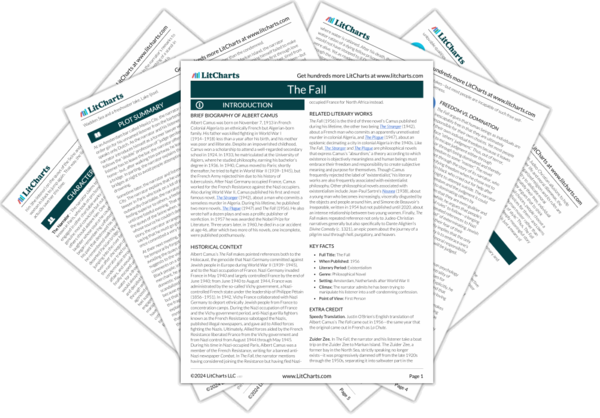Guilt and Judgment
In The Fall, the narrator implicitly argues that all human beings are “guilty,” in the sense that each individual is ultimately responsible for their own choices, some of which are inevitably bad. This universal guilt exposes all human beings to others’ judgment, a judgment that each individual finds intolerable and attempts to escape. The narrator illustrates the fundamental guiltiness of human beings by describing his own past self. The narrator was once an outwardly…
read analysis of Guilt and JudgmentFreedom vs. Domination
The Fall argues that human beings as individuals are inescapably free in that they are ultimately responsible for their own choices. Yet most people are terrified of their own individual freedom because it leaves them “alone” to face “others’ judgment.” Thus, out of terror, most people seek to escape judgment either through dominating others or through being dominated and thereby surrendering their freedom to some “master.” The novel forwards this argument through the story of…
read analysis of Freedom vs. DominationEgotism
In The Fall, egotism is central to human psychology and action. The novel conveys the centrality of egotism through its narrator, who argues for egotism’s importance both explicitly and implicitly. Explicitly, he claims that individuals “can’t love without self-love” and that “the joy of self-esteem” is what motivates individuals to loving or virtuous behavior—while threats of self-esteem can motivate them even to murder. The narrator repeatedly makes himself an example of this kind…
read analysis of Egotism
Hypocrisy and Inauthenticity
The Fall suggests that people tend toward hypocrisy due to their egotism. On the one hand, people’s egotism makes them selfish and thus, in conventional terms, immoral. On the other hand, people’s egotism makes them want to believe that they are moral and good. Moreover, one’s egoism makes one want others to believe in one’s morality and goodness. The conflict between people’s selfishness and their desire to appear good leads them to hypocritically “playact” morality…
read analysis of Hypocrisy and InauthenticityJudeo-Christianity
The Fall implies that Judeo-Christian narratives are a useful framework for understanding the human condition. At the same time, the. novel also argues that people use organized religion and its dogmatic rules to shirk individual responsibility for their own free choices. First, the novel implies the usefulness of Judeo-Christian narratives by alluding to these narratives in its title and its text. The “fall” of the title refers to three things. First, it refers to the…
read analysis of Judeo-Christianity






